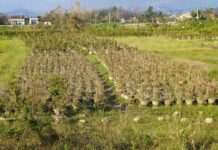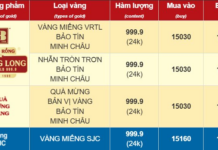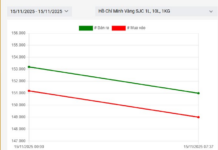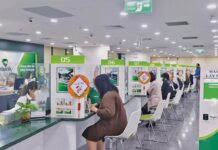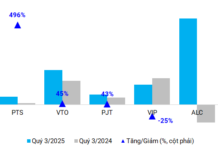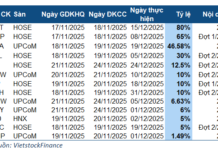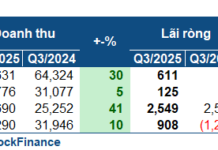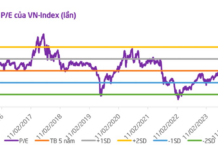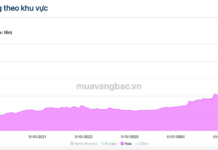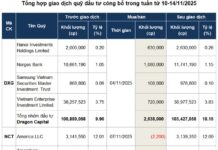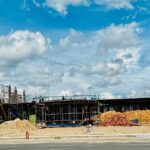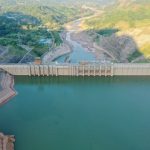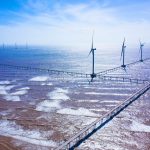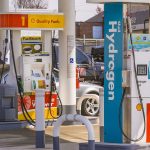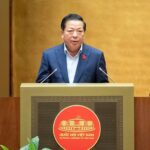At the 3P Green Impact Summit, Mr. Tim Evans, CEO of HSBC Vietnam, shared his insights on the urgency of addressing climate change.
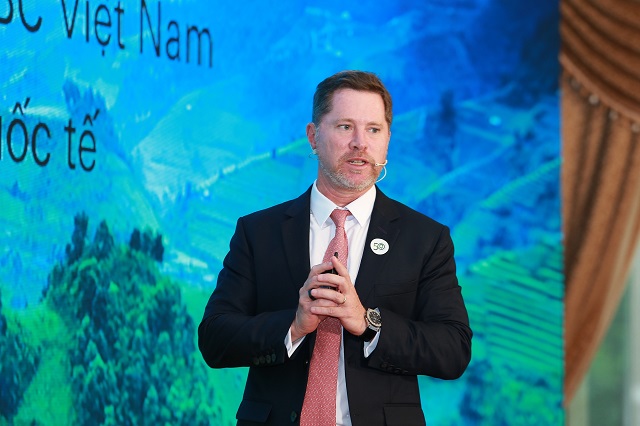
Mr. Tim Evans, CEO of HSBC Vietnam
|
The Climate Emergency
The United Nations estimates that by the end of this century, temperatures will rise by 3°C as the pace of emissions reduction is not meeting the conditions required to achieve globally agreed net-zero targets.
A report by the Intergovernmental Panel on Climate Change (IPCC) this year estimates that nearly half of the global population is living in areas highly vulnerable to climate change. The World Bank’s estimates are even higher. According to their November 2023 policy research report, 4.5 billion people are affected by extreme weather events such as flooding, droughts, tropical storms, or extreme heat.
Businesses will play a crucial role in the collective efforts to address this crisis.
Fighting Climate Change: What Can Be Done?
Over the past two years, Vietnam has made significant strides in its journey towards combating climate change, from its net-zero commitment at COP26 to the National Strategy on Climate Change. However, the focus of this journey remains unchanged.
First, cooperation is key. Climate change is a challenge that no single individual, business, or government can solve alone. In fact, there has never been a more crucial time for all of us to work together. Individuals, businesses, organizations, and governments need to unite and align their efforts to achieve ambitious climate goals.
Second, energy transition is at the core. With 80% of the world’s primary energy supply coming from coal, oil, and gas, the extraction, transportation, and use of these fossil fuels account for about three-quarters of global carbon emissions. Similar to many other countries, Vietnam’s journey heavily relies on a large-scale transition to cleaner energy sources. Coal provides about three-quarters of the country’s total electricity production. The increasing reliance on coal reflects the growing demand for electricity due to economic recovery and extreme heat, which leads to more air conditioning usage. Achieving net-zero emissions requires a careful consideration of phasing out coal-fired power plants while ensuring that electricity production meets the increasing demand through new and cleaner renewable sources.
“At COP28 last year, I was impressed by Vietnam’s determination to triple its renewable energy production by 2030 and gradually shift away from fossil fuels. The role of renewable energy is also emphasized in Vietnam’s Power Development Plan 8, which aims for renewable energy to account for over 30% of the energy mix,” said the CEO of HSBC Vietnam.
The good news is that Vietnam has a vast potential for renewable energy due to its favorable natural conditions, and the government has committed to achieving net-zero emissions by 2050. The country’s natural resources present an opportunity to attract more investment in the growing renewable energy sector, but there is also a need to encourage greater participation from the private sector.
The Crucial Role of the Financial Sector
Banks like HSBC can support Vietnam in maintaining its growth trajectory through a well-managed transition to cleaner energy sources, building long-term resilience, and supporting workers and communities along the way. As a global bank, HSBC has a unique role to play in the journey towards net-zero emissions. This is achieved through our ability to provide financial support, connect investors with key projects worldwide, and offer a range of sustainable and ESG financial products that integrate sustainability goals with business objectives.
Most importantly, we support our clients in their transition journey – this is where HSBC can have the most significant impact. Second, HSBC aims to bring capital to where it is needed most, which means partnering with governments and humanitarian and social organizations to create systemic change.
In 2022, HSBC signed a Memorandum of Understanding (MoU) with the Ministry of Natural Resources and Environment, supporting the Ministry in developing practical approaches to realize its strategies in line with Vietnam’s net-zero targets and unlocking international finance to support these goals. The latest initiative under this MoU is a series of workshops on “Enhancing Capacity, Disseminating Legal Regulations on Climate Change and Energy Transition Solutions” held in Hanoi, Can Tho, and Nha Trang. These workshops provided crucial policy updates, trends, and energy transition solutions to 450 local businesses, which are vital for their transition towards net-zero emissions.
The capacity of banks to engage in such efforts can be further enhanced through collaboration – bringing together the necessary parties to overcome challenges. The Just Energy Transition Partnership (JETP) is a prime example. JETP is a multilateral financial agreement that connects G7 countries, financial institutions, and governments to accelerate the phase-out of coal and address associated social consequences.
In 2022, Vietnam signed a JETP agreement with the International Partners Group, comprising developed countries, to provide USD 7.75 billion, equivalent to half of the committed funding for Vietnam’s transition to green energy. The finance pledged by the private sector-led Glasgow Financial Alliance for Net Zero (GFANZ), of which HSBC is a member, is expected to mobilize at least an equivalent amount. This funding will help bridge the investment gap and attract billions of dollars into Vietnam’s transition process.
However, there is still much to be done to make this model truly effective between public and private partners. For this model to succeed in any country, national policies must support the phase-out of coal and the expansion of renewable energy sources, including enabling infrastructure such as smart grids and energy management systems. HSBC is committed to supporting this model to turn ideas into actionable deals and ensure that investment capital is quickly directed towards sustainable projects.
Challenges and Obstacles
First, the challenge of decoupling economic growth from emissions. Typically, economic growth is associated with increased carbon emissions and energy consumption. Therefore, adhering to old growth models will have negative consequences for the natural environment and the climate. However, the good news is that this link no longer exists in developed countries. For example, the US has doubled its GDP since 1990 while reducing its carbon emissions.
This link has also weakened globally. China’s GDP has grown 14 times since 1990, but its carbon emissions have only increased fivefold. In India, GDP growth has outpaced carbon emissions by over 50%. The growth of China and India has been more energy-efficient than that of Europe in the past, benefiting from new technologies. As such, Vietnam can also maintain its rapid growth while transitioning towards net-zero emissions. Since 1990, Vietnam’s GDP has increased 66-fold, while carbon emissions have risen 12-fold. Banks like HSBC can provide financial support for both economic growth and carbon emissions reduction.
Second, investing in sustainable infrastructure often faces obstacles due to a lack of projects that are attractive to investors. This is partly due to a limited number of bankable projects that meet investors’ risk and return requirements. HSBC can mobilize capital from the private sector on a large scale by developing a portfolio of bankable projects and scalable blended finance models. Additionally, the lack of harmonization between classification systems makes financial decisions challenging. Improving interoperability and consistency in sustainable and transition finance could boost investor confidence. Third, there is a need for more corporate transition plans and comparable emissions data to enable banks to assess and finance their clients’ transitions.
Financial platforms like Pentagreen, a joint venture between HSBC and Temasek, offer a viable solution to overcome bankability challenges by combining public and private capital for sustainable infrastructure. This debt-focused financial platform aims to deploy blended capital in the form of large-scale loans to unlock and crowd in commercial capital for less bankable projects, promoting sustainable infrastructure development in Asia, with an initial focus on Southeast Asia.
The main focus is on renewable and energy storage, clean transportation, as well as water and waste management. Transactions in other areas, such as climate adaptation, agriculture and land use, and technology-driven solutions, may also be considered in the future.
Recently, Pentagreen and Clifford Capital, an infrastructure financial platform, announced a collaboration to provide a $30 million green loan to BE C&I Solutions to facilitate the development of sustainable bioenergy projects across Southeast Asia and India.
More can be done to reduce the risks associated with blended transactions. For instance, policy measures at the national level could enable banks to participate by identifying a pipeline of bankable projects. Additionally, establishing national contract frameworks for wind, solar, and other renewable energy sources could benefit financial institutions seeking to engage, creating uniformity and comparability between projects to facilitate risk assessment. Most blended finance is deployed at the transaction level and is not easily replicable.
Bình Thuận’s Dragon Fruit: A New Path for Sustainable Agriculture and Reduced Emissions
The initial successes in growing dragon fruit and reducing greenhouse gas emissions, as well as carbon footprint tracking in Binh Thuan, are evidence that Vietnam has, is, and will be able to apply innovative approaches to develop sustainable agriculture, adapting to climate change…
Sharp Decline in Consumption, Warning of Very Low Water Levels in Hydropower Reservoirs
The Ministry of Industry and Trade’s Electricity Regulatory Authority has announced that electricity consumption during the Lunar New Year holiday is significantly low nationwide. In light of the low water levels in the hydropower reservoirs in the northern region, coal-fired and renewable energy power plants have been maximally utilized.
Advantages of Producing Green Hydrogen from Offshore Wind
In order for clean hydrogen to develop and thrive in Vietnam, it is necessary to implement supportive policies from the Government to ensure the competitiveness of clean hydrogen sources.

